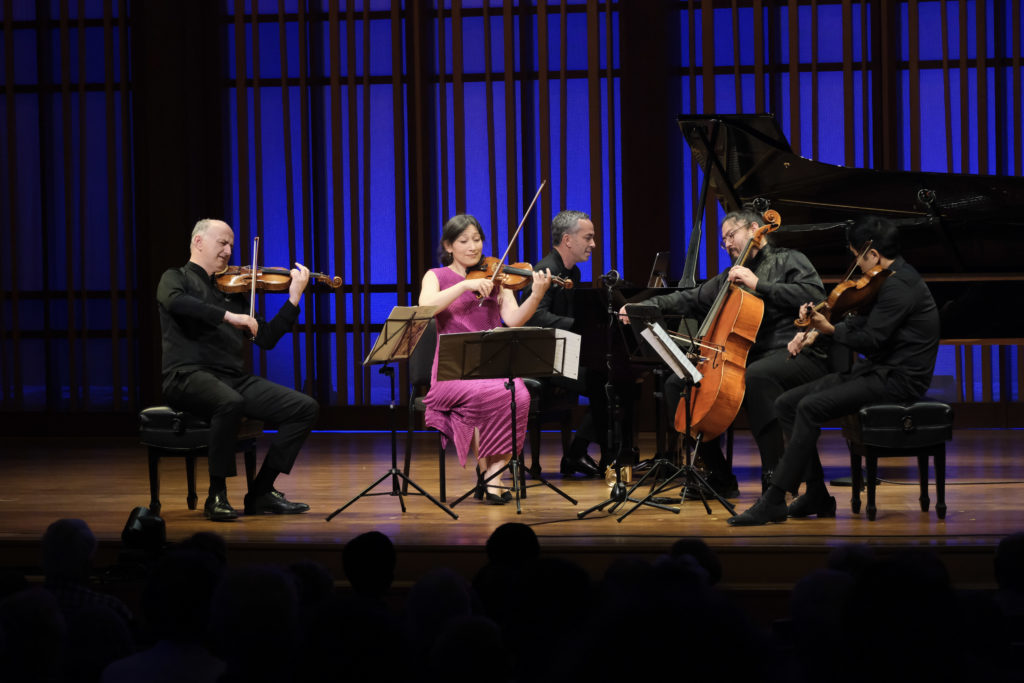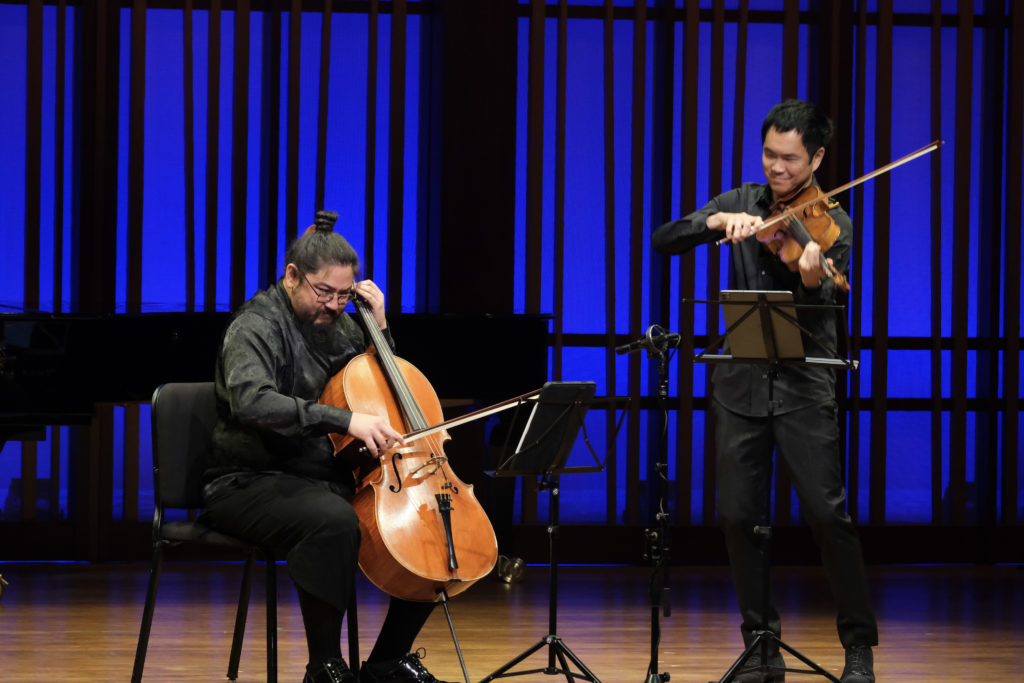Wednesday’s SummerFest Program Goes All-American–Almost!
SummerFest Music Director Inon Barnatan was surely winking at his loyal festival audience when he titled Wednesday’s program The Great Americans. Two of the three composers on the program are indeed American—Amy Beach and Paul Wiancko—but Antonín Dvořák? If you did not attend Wednesday’s SummerFest concert but are up on classical chamber music, you have probably already guessed that the Dvořák contribution to the program was his Quartet in F Major, Op. 96, always referred to as his “American” Quartet because he composed it when he lived in the U.S.

(l. to r.) Edward Dusinberre, Harumi Rhodes, Inon Barnatan, Paul Wiancko & Richard O’Neill [photo (c.) Ken Jacques]
Beach’s Piano Quintet was written in 1907, a time when the daring European composers were moving western music in bold new directions. Maurice Ravel had already completed his String Quartet (1903), Claude Debussy his orchestral poem La mer (1905), and Arnold Schoenberg was flirting with atonalism in his 1907 choral work Friede auf Erden.
But in 1907 Amy Beach was looking back to the glory days of Romanticism, and I agree with Barnatan’s introductory remarks on Wednesday that Beach’s Piano Quintet reflects the dramatic style and lush harmonic palette of Richard Wagner.
The Piano Quintet’s opening movement starts with a dreamy “Adagio” that quickly turns into a rhapsodic “Allegro.” Pianist Barnatan and the strings of the Takács Quartet gave an exhilarating account of this adventurous movement, with emotionally charged solos from Barnatan and Takács second violin Harumi Rhodes. Because of illness, Takács cellist András Fejér—the only original member of this storied string quartet that formed in Budapest in 1975—was replaced by Paul Wiancko, a cellist who was already on the SummerFest Wednesday program.
Although Wiancko’s timbre is a bit more muscular than the overall Takács sonority, his tight integration into the quartet’s ensemble was nothing short of miraculous on such short notice. Wiancko currently serves as cellist to the Kronos Quartet, but every string quartet ensemble has its own unique ethos, and fitting into another quartet is no mean feat! In addition to Rhodes, the other Takács members are first violin Edward Dusinberre and violist Richard O’Neill.
In Beach’s quiet but somewhat anxious “Adagio,” Wiancko offered a melting solo in this episodic middle movement. The brisk final movement opens with an angular first theme, confidently offered by first violinist Dusinberre, and accompanied by rich piano flourishes from Barnatan. Violist O’Neill captured the intense yearning of the movement’s second theme, which was followed by a spirited fugue. Although Beach was a self-taught musician, her technique was formidable. And before the smashing final cadence, Beach took a short break for a piano solo that evoked a nostalgic Chopin nocturne.
Having joined the Takács team to perform the Beach Piano Quintet, Paul Wiancko invited Takács violist Richard O’Neill to join him performing Wiancko’s own 2014 duo American Haiku. A concise 10-minute virtuoso etude in three short movements, American Haiku gives each player ample opportunities to flaunt cadenza-like solo flourishes, display a variety of extended string techniques, and join together in plangent duets. Like SummerFest’s Composer-in-residence Thomas Adès, Wiancko exhibits an edgy postmodern style that gingerly invites the audience’s favor without pandering.Even with their substitute cellist, the Takács Quartet gave a vibrant, disciplined, sunny account of Dvořák’s beloved “American” String Quartet. I was impressed by violinist Dusinberre’s nuanced melancholic lead theme in the “Lento,” more than matched by Wiancko’s emotionally rich but understated reprise of the same. Violist O’Neill launched the quartet’s opening movement saluting its high-spirited main theme garbed in his glowing, sable timbre. The brilliance and energy Takács brought to the closing “Vivace” brought this SummerFest audience immediately to its feet in raucous approval.
This concert was presented by the La Jolla Music Society on Wednesday, August 9, 2023, in the Conrad Prebys Performing Arts Center.

Ken Herman, a classically trained pianist and organist, has covered music for the San Diego Union, the Los Angeles Times’ San Diego Edition, and for sandiego.com. He has won numerous awards, including first place for Live Performance and Opera Reviews in the 2017, the 2018, and the 2019 Excellence in Journalism Awards competition held by the San Diego Press Club. A Chicago native, he came to San Diego to pursue a graduate degree and stayed.Read more…

